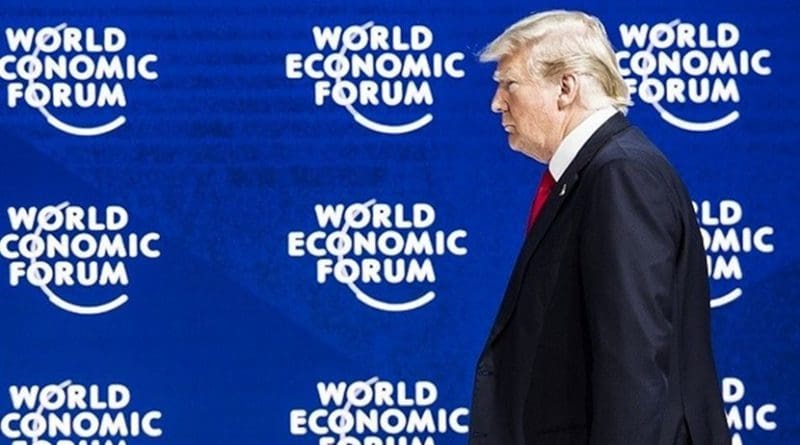Probably Premature, But Markets On Alert For ‘Trump Bust’ – OpEd
By Arab News
By Frank Kane*
It is the proud boast of President Donald Trump — repeated in almost identical terms in his Davos speech and State of the Union address — that he has presided over an unprecedented period of economic growth, job creation and wealth accumulation.
You cannot argue with the facts. Since his election in November 2016 there has been weekly growth in all the main US economic indicators. Stock markets are at record highs, the International Monetary Fund recently upgraded US (and world) growth forecasts, and jobs and wages are also on the rise.
You might argue that most of that growth was down to the very sensible economic policies of his predecessor, bolstered by the long-term policy of the Federal Reserve to keep interest rates low. You might also argue that the final part of the rise was down to the stimulus of Trump’s tax cuts legislation.
But whichever way you cut it, the Trump boom — testimony to his “stable genius” in business matters, as he makes clear — was a feature of his first year.
Until last week, that it is, when a slew of economic factors came together to change the picture. Equity prices had their worse trading week of Trump’s presidency, while bond markets saw renewed volatility and uncertainty.
The question on market analysts’ lips is now: Is the Trump boom about to give way to the Trump bust? And, if so, is his presidency equipped to deal with a market downturn?
On the first question, the jury is still out, but there were enough worrying signs to prompt talk in Western markets of “adjustment” and “correction.” That is a long way from “crash” or “crisis,” but still enough to cause concern.
It was a reminder of the interconnectivity of economic forces. Jobs and wages statistics from the US authorities have been good, showing steady increases in both, but that was the spark that lit a bonfire under already combustible equity and bond markets. The specter of inflation, long under control during the gentle US economic recovery, loomed once more.
Inflation implies that the Fed will have to raise interest rates to dampen it down. The US central bank, under the stewardship of Janet Yellen, had long signaled that rate rises were necessary. Her successor, Jerome Powell, will surely cut quickly.
Rising interest rates are good for bonds but what is good for bonds is not necessarily good for equity markets. That was a big part of the explanation for last week’s falls on Wall Street and other markets as investors repositioned asset allocations ahead of an expected surge in bond yields. This trend is likely to continue for the rest of the year, as further Fed cuts come through.
All eyes are likely to be on global equity markets Monday as the trading week begins in the big markets, to see if last week’s falls were the beginning of the end for the long-running bull market, or whether the short sharp correction has realigned markets for the time being.
The big Gulf markets, often an early warning system for global problems because they trade on a Western weekend day, were down on Sunday but not by enough to start an alarm.
The optimists think that the recent declines in equities is the end of it, and that the US can get back to wealth creation.The pessimists, who also claim to be the realists, believe that even if last week’s falls prove to be short-lived, it is only building up pressure in overvalued global equity markets that must blow at some stage.
The Cassandras are pointing to autumn as the timing for the real Trump bust, for several reasons. The pressure will have been increased in equities even more by then, with further interest rate rises; the stimulus novelty of the tax package will have worn off; and most market crashes historically occur in the autumn.
To that list of reasons might be added the suggestion that Trump will have made the whole political and economic state of the US even more unstable and volatile by then, which brings us to the second question: Will Team Trump be able to handle a market crisis, if and when it comes?
On one hand, the signs are good. Trump is a successful businessman, after all, and he has stuffed his Cabinet and advisory team with similarly “transactional” people from the world of private equity, investment banking and corporate boardrooms. Surely the US economy is safe with them?
On the other hand, some critics of the US president have pointed to his uneven business record, with numerous bankruptcies and failures, as a reason we should be worried about his handling of a crisis.
But if things get really serious, surely the president will realize his shortcomings and rely on the advice of his appointed advisers, including the new Fed boss Powell?
That does not seem a very Trumpian prospect. If further rate rises, advocated by the Fed on macroeconomic grounds, are continuing to affect stock markets, will the president really leave matters in the hands of Powell, who was an appointee of former President Barack Obama and is said to be a “consensus builder”?
There are some, mainly in the ranks of the anti-Trump “resistance,” who would welcome the schadenfreude of a Trump bust; the rest of the world, including the Middle East with a big program of bond issuance and a need for oil-price stability, might hope for the best, but plan for the worst.
*Frank Kane is an award-winning business journalist based in Dubai. He can be reached on Twitter @frankkanedubai


Our markets are manipulated by the banksters